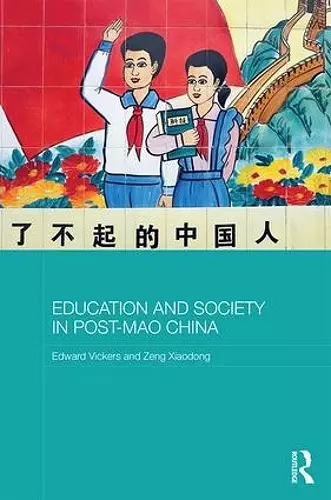Education and Society in Post-Mao China
Edward Vickers author Zeng Xiaodong author
Format:Hardback
Publisher:Taylor & Francis Ltd
Published:24th May '17
Currently unavailable, and unfortunately no date known when it will be back
This hardback is available in another edition too:
- Paperback£45.99(9781138364530)

The post-Mao period has witnessed rapid social and economic transformation in all walks of Chinese life – much of it fuelled by, or reflected in, changes to the country’s education system. This book analyses the development of that system since the abandonment of radical Maoism and the inauguration of ‘Reform and Opening’ in the late 1970s.
The principal focus is on formal education in schools and conventional institutions of tertiary education, but there is also some discussion of preschools, vocational training, and learning in non-formal contexts. The book begins with a discussion of the historical and comparative context for evaluating China’s educational ‘achievements’, followed by an extensive discussion of the key transitions in education policymaking during the ‘Reform and Opening’ period. This informs the subsequent examination of changes affecting the different phases of education from preschool to tertiary level. There are also chapters dealing specifically with the financing and administration of schooling, curriculum development, the public examinations system, the teaching profession, the phenomenon of marketisation, and the ‘international dimension’ of Chinese education. The book concludes with an assessment of the social consequences of educational change in the post-Mao era and a critical discussion of the recent fashion in certain Western countries for hailing China as an educational model. The analysis is supported by a wealth of sources – primary and secondary, textual and statistical – and is informed by both authors’ wide-ranging experience of Chinese education.
As the first monograph on China's educational development during the forty years of the post-Mao era, this book will be essential reading for all those seeking to understand the world’s largest education system. It will also be crucial reference for educational comparativists, and for scholars from various disciplinary backgrounds researching contemporary Chinese society.
'Perhaps no subject excites as much attention in China as the future of education. Vickers and Zeng have crafted a comprehensive, thoughtful and highly readable analysis of how - and why - China's education system works as it does. Combining attention to issues of ideology, finance, and the place of education within an emerging middle-class society, their book will surely become a standard account for years to come.'
Rana Mitter, University of Oxford China Centre
'We have long been in need of a well-researched and up-to-date overview of how the world’s largest education system has evolved over time, what it looks like today, and the implications of this transformation. Now such a book is finally available! Vickers and Zeng’s study is a pleasure to read, and will be an essential reference for courses on comparative and East Asian education, and for all scholars researching contemporary Chinese society.'
Mette Halskov Hansen, University of Oslo
'Vickers and Zeng provide a thorough and well-researched overview of the post-Mao education system and its relationship with Chinese society and politics, analyzing the changes of the past four decades. With its impressive breadth and depth, this book will be invaluable for anyone who wants to understand how education works in China.'
Vanessa Fong, Amherst College
'Education and Society in Post-Mao China plugs a major gap in the English-language literature by achieving its aim of offering a “reasonably comprehensive” and “historically informed and critical … commentary” on the development of Chinese education in the past 40 years of rapidly changing and often turbulent circumstances.'
Comparative Education
'Education and Society in Post-Mao China is essential reading for anyone interested in understanding contemporary Chinese society.'
The China Quarterly
'Edward Vickers and Zeng Xiaodong dig beneath the surface of these issues, describing and evaluating education in China since 1978. Success, of course, ‘depends on what one thinks education is ultimately for’ (p. 328) and, in attempting to respond to this question, the volume identifies the mainstream ideology on the purpose of education in China and the debates and tensions centred on policy-making.'
Tim Summers, The Chinese University of Hong Kong and Chatham House, Hong Kong
ISBN: 9780415597395
Dimensions: unknown
Weight: 748g
408 pages